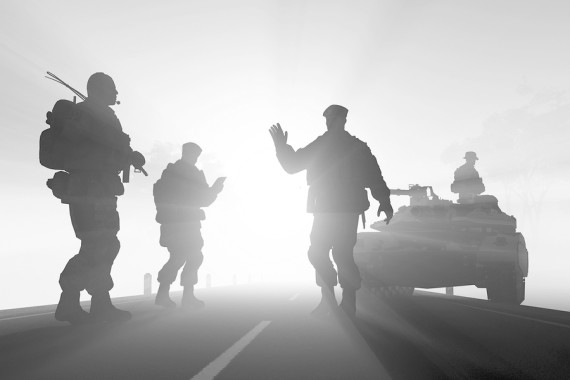WASHINGTON — Former Army Capt. Tom Tarantino has no idea if his vote reached the United States when he was deployed in Iraq.
“I wasn’t notified,” Tarantino, 36, said. “I didn’t even know if they counted my vote.”
He returned from Iraq in 2006 after a year of deployment with the 11th Armored Calvary Regiment, where he served as both a cavalry and mortar platoon leader. He also organized voting for his platoon.
Tarantino, now policy associate for Iraq and Afghanistan Veterans of America, left the service in 2007.
“I wanted to make sure that our soldiers had the opportunity to participate in democracy since they were fighting for it,” Tarantino said in an interview.
The Overseas Vote Foundation and U.S. Vote Foundation hosted their annual Voting and Elections Summit on Thursday to discuss voting problems domestically and abroad. Military voting was among their concerns.
For the 2012 election, the United States sent 876,000 ballots to soldiers stationed away from their home states or abroad. California, Florida, New York, Texas and Washington each sent more than 50,000 ballots.
Of the ballots sent, 22.2 percent were not returned, and their status remains unknown. Of the 606,425 ballots that were returned, 98.5 percent were counted.
“It’s not one of the big, sexy concerns because it doesn’t make headlines,” Tarantino said. “But it is a major concern.”
Tarantino said he thinks voters know more about absentee ballots now, but complications in timing the mail and working around each state’s policy for absentee ballots remain an issue.
“The initial problem with absentee ballots is that you have to know how to vote and register according to where you live,” Tarantino said.
Voting for military personnel stationed abroad has come a long way since Tarantino’s deployment. The 2010 Military and Overseas Empowerment Act made strides in getting voter registration information and ballots to personnel stationed abroad by requiring that state ballots be available 45 days before an election.
Adam Ambroji, an investment principal working on election administration processes at the Democracy Fund, told participants at the summit that the law requires states to allow time for ballots to make the round trip from a soldier’s home to his overseas location and back.
He said that, as the MOVE Act went into effect, he worked to offer military and other overseas voters the option to request an absentee ballot via e-mail. Voters would print the ballot, scan it and return it.
“You can go from 40 days to potentially immediately if you submit a ballot online,” Ambroji said.
A San Anselmo, Calif., native, Tarantino relied on his mother to send him his ballot when he was stationed in Bosnia in 2000.
“There was no method for me to do it,” Tarantino said. “If my mom hadn’t done that, I probably would have missed the primary.”
The method of ballot delivery is an issue with today’s technology. Although the Internet is fast, it may not be available to those overseas or secure enough to prevent ballot tampering.
“Some folks say, ‘I don’t care, I have so much trouble getting the ballot. I just want it remotely.’ Others say, ‘Well, I really think that it’s important that I can print out the ballot and hold it in my hand and I can verify that it’s mine,’” Ambroji said.
But the law can’t solve every problem.
“When you’re in combat, sometimes you don’t even realize what day it is,” said Tarantino. “But it is still incumbent on the voter to do it on time.”
Caitlin Turner is a senior journalism major at Ohio University. She is currently participating in the Scripps Howard Foundation’s Semester in Washington program. She can be reached at [email protected].






